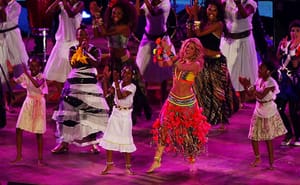Members of the South African band Freshlyground are campaigning to find out what is happening to the millions of rands still being earned by the official 2010 Soccer World Cup song, WakaWaka, which were supposed to go to African charities. Repeated attempts by the band to get answers about where the money has gone have been met with silence, raising the possibility that it is being absorbed by Fédération Internationale de Football Association (Fifa) or record company Sony Music, or both.
The 2010 track is a reworking of Zamina Mina, written and performed in the mid-80s by the Makossa band Golden Sounds (Zangaléwa), a group of Cameroonian soldiers and musicians. For the World Cup version, Shakira and Freshlyground added new lyrics, pop arrangements, and their own distinctive elements, turning the military marching song into a global anthem.
The original version mixed French, English, Pidgin and Fang, and became hugely popular across Africa, the Caribbean, and in Latin American military circles. Playful and partly satirical, it was a marching song for soldiers, with “waka waka” being West African Pidgin for “do it” or “walk while working”. The track (a portion of which, you can hear in the video below) allegedly pokes fun at African soldiers who served in colonial armies, referencing their uniforms and discipline – a far cry from the smash soccer hit that still plays on radios today.
Neither Fifa nor Sony Music have explained to the band how the proceeds of the song’s royalties have been distributed, despite requests going back years in Sony Music’s case. FIFA has not responded to Currency’s requests for information, made weeks ago, other than acknowledging receipt of emails requesting information.
A global hit that just kept on paying
WakaWaka was a massive hit at the time it was released and is perhaps the most iconic official World Cup song, hitting number one in 15 countries and racking up 4.3-billion views on YouTube to date. The song also has just under a billion listens on Spotify. Unlike most World Cup songs, it has proved extraordinarily resilient, and over the years still regularly features in the top 20 songs by a female artist on streaming sites and YouTube.
The featured artist was Colombian singer Shakira, who still uses it at her current live shows as the finale song, and Freshlyground also contributed a unique element to the track. But neither Freshlyground nor Shakira have benefited financially from the song because at the time, the arrangement between the publisher, Sony Music, and soccer’s the world governing body, FIFA, was that the proceeds would go to African charities.
Proceeds from the song did help fund Fifa’s “20 Centres for 2010” campaign, according to Fifa documents, which eventually did build facilities in 15 African countries and at least five centres in SA. But the campaign was wound up in 2014.
Since then, the song has continued to be played with extraordinary frequency, racking up, at the absolute minimum, $9-million in royalty earnings since 2014. Members of the band have written to Sony Music to try to track down what is happening to these earnings, so far, to no avail.
Technically, Sony Music may also not be eligible to reap earnings from the song because it too said at the time it would make its contribution to the production pro bono, as Fifa insisted at the time. But what is happening to the earnings now that the Fifa campaign has ended is a mystery. At the time of going to press, Sony Music’s African representatives have not responded to Freshlyground’s inquiries. Attempts to contact Shakira’s management have also not yet borne fruit.
“We are not looking for a pay day here, but we would like to know that the proceeds of the song are in fact going to charities as originally intended, and we would like to specify which charities should be supported as we were originally promised,” says Freshlyground member Simon Attwell.
There is a twist to the events too, because it appears the contract that would confirm the rights to the song had been handed over was never “executed” as envisaged.
In 2010, Freshlyground received an email from Sony Music’s head of US business and legal, Stephanie Yu, which said Sony Music had been selected to create an official song for the World Cup that would be sold as a single and as part of a multi-artist compilation album featuring recording artists from around the world.
“All net profits from sales of the Single and Official Album will be donated to African charities selected by the participating artists,” the email said. It also said: “All rights in the Master, including without limitation, the worldwide copyright, will be owned by SME (Sony Music Entertainment) in perpetuity.”
It ended saying “this proposal remains subject to fully executed contracts and additional internal SME approvals”. According to Attwell, the envisaged contracts were never actually signed.
Consequently, he has written to Sean Watson, the managing director of Sony Music Entertainment Africa, asking for “urgent clarification” on the master royalty agreement and charitable proceeds.
In his email, Attwell says Freshlyground granted a gratis royalty based on Sony Music’s representation that net profits would benefit African charities selected by participating artists. But he adds, “When we nominated our selected charity, we were told this arrangement didn’t apply to African participating artists.”
“We’ve now been informed that proceeds went to a Fifa campaign that appears to have been inactive since 2014. Our 2013 request for transparency on this matter went unanswered. Despite multiple requests, we have received no sales figures or earnings reports to date.”
He asks for sales figures, earnings, an accounting of where the proceeds have been allocated, and clarification of the current status and beneficiaries of any ongoing proceeds.
“This situation has gone on far too long without resolution. The lack of transparency and apparent inconsistencies in the charitable arrangement are unacceptable. If the proceeds have indeed benefited African charities as originally represented, we would be delighted to hear this and help share that positive story. However, we cannot do so without proper documentation and transparency,” he writes.
Neither Sony Music nor Fifa has responded to repeated attempts for clarity on the topic. Should they do so, their comments will be added. 💥
First published in Currencynews.co.za. Subscribe here.




Join the conversation